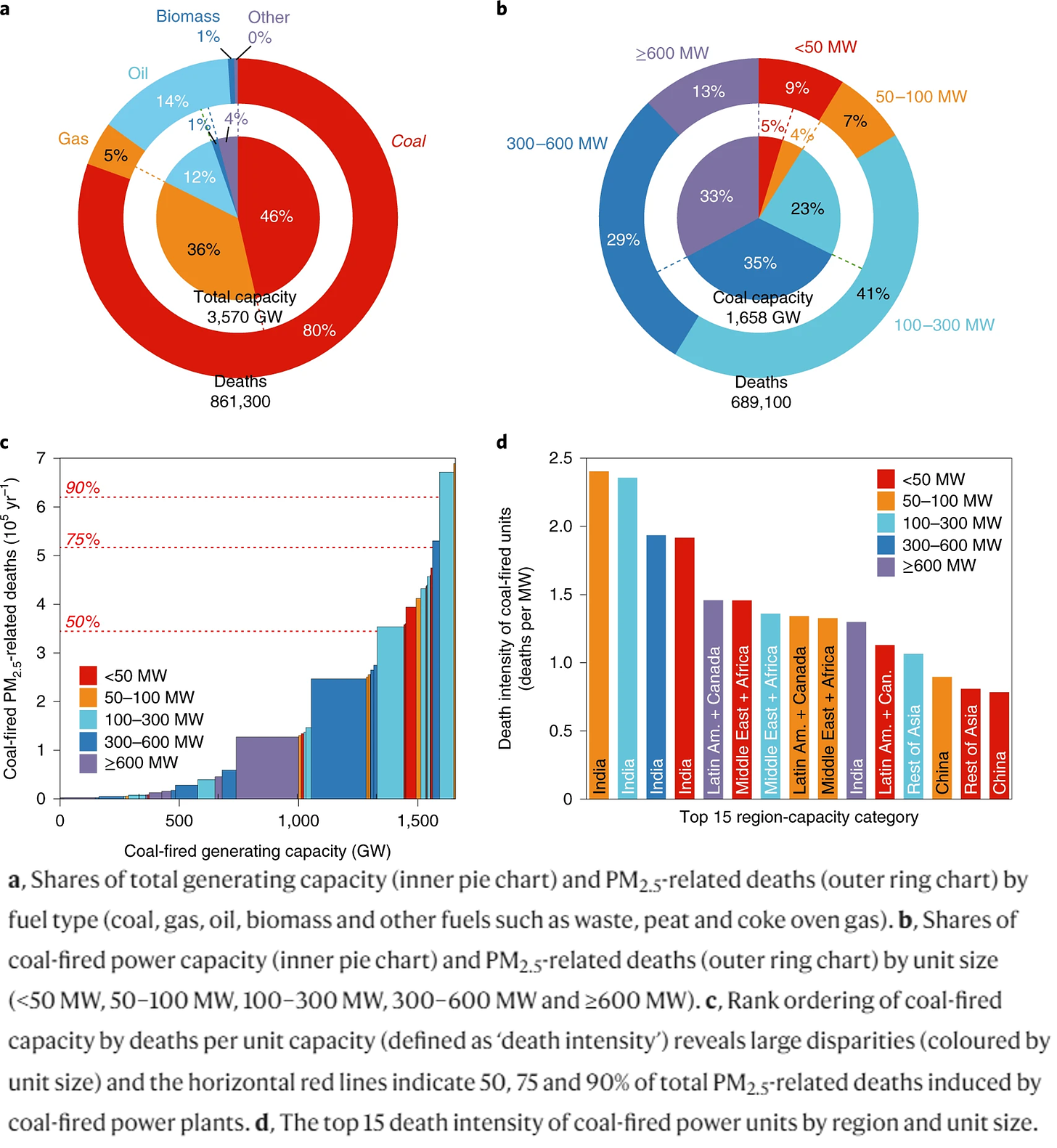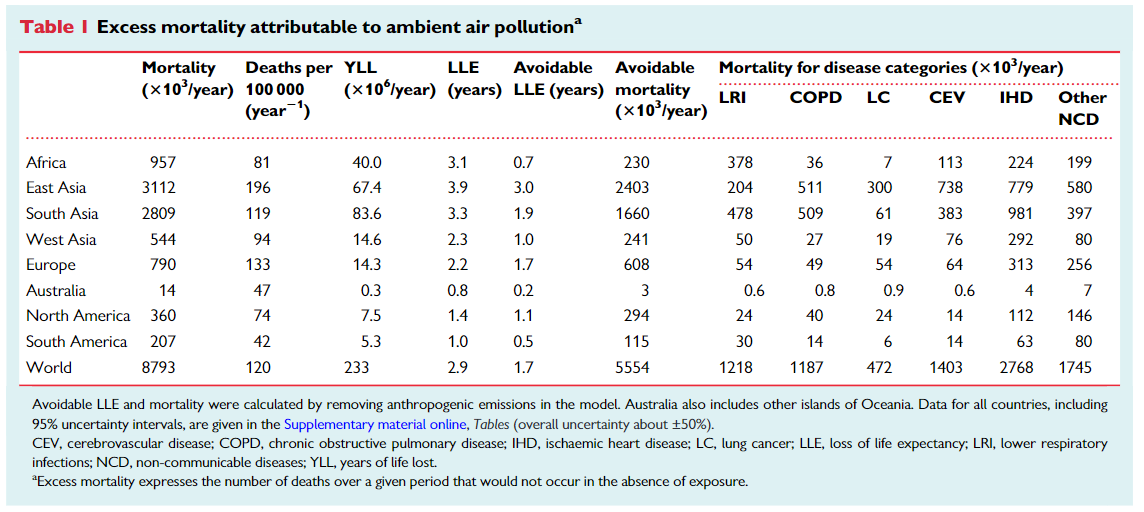Five Million Preventable Deaths per Year
The best reason yet for a global coal exit agreement
Climate change is not the only consequence of the burning of fossil fuels. A 2020 study published in Cardiovascular Research estimated that in 2015, the deaths of almost 9 million people worldwide were attributable to air pollution from the burning of fossil fuels — mainly in Asia. Of those deaths, more than 5 million are avoidable. You can see their results in the table below.
The numbers are staggering — They equate to more than 15,000 avoidable deaths per day, every day, under the study’s mean estimates. Excess deaths from fossil fuel air pollution comprises about 40% of all air pollution deaths. Overall, the authors claim that the loss of life expectancy globally from air pollution exceeds that of smoking by one third.
The study found that “the mortality from air pollution is dominated by East Asia (35%) and South Asia (32%), followed by Africa (11%) and Europe (9%).” China and India lead the way with an estimated 1.6 million and 700,000 deaths, respectively. The United States ranked third, with almost 200,000 deaths. Europe, as a whole, had an estimated 430,000 deaths.
Perhaps if we spoke as much about “death intensity” of coal energy as we do of its “carbon intensity” we might focus minds more quickly on the importance of relegating coal technology to the past.
Air pollution mortality is global, as air pollution occurs everywhere. We can often see air pollution, but seeing air pollution mortality is much more difficult. The annual avoidable mortality consequences of air pollution are similar in magnitude to 50 passenger jets crashing every day. However, air pollution is a silent killer and thus easy to overlook in a way that air disasters are not.
The burning of fossil fuels also includes the small-scale burning of biomass (like wood) and coal in residences in some places for cooking and heating. Modern society has been built on fossil fuels, but fortunately technological and societal innovations have created alternatives to the burning of coal in particular. There is no technological reason why a global coal phase out could not be implemented starting today.
A 2021 study in Nature Climate Change concluded that the retirement of the most polluting coal plants could save millions of lives, as you can see in the figure below from that paper.

The figure refers to the “death intensity” of different coal power plants, which are by far the dominant source of mortality related to the burning of fossil fuels. Perhaps if we spoke as much about “death intensity” of coal energy as we do of its “carbon intensity” we might focus minds more quickly on the importance of relegating coal technology to the past.
Recognizing the large effects of air pollution on human health has no doubt been masked by the long-term trend of increasing human lifespans – due in no small part to energy consumption from fossil fuels, including coal. But as the Cardiovascular Research paper notes,
The global mean life expectancy increased from 52 years in 1960 to 72 years in 2015 (and 80 years in high-income countries), but in many low-income countries, including sub-Saharan Africa, it is still below 60 years.
The four coal power plants with the highest “death intensity” are each in India. The public health benefits of exiting from coal are not evenly spread around the world, and are concentrated in the regions with the most and dirtiest coal plants.
Air pollution mortality from coal burning also occurs in places that are extremely wealthy. A 2019 study estimated the air pollution consequences of Germany’s nuclear phase-out. That study, published by the National Bureau of Economic Research, focused on the shut-down of 10 of Germany’s nuclear power plants from 2011 to 2017 and found that,
the switch from nuclear power to fossil fuel-fired production resulted in substantial increases in global and local air pollution emissions… lost nuclear production was replaced by electricity production from coal- and gas-fired sources in Germany as well as electricity imports from surrounding countries.
The study concluded that “the [nuclear] phase-out resulted in more than 1,100 additional deaths per year” due to excess mortality from the consequences of increased air pollution. Since 2011 that totals more than 10,000 deaths, far more than all deaths attributable to nuclear power in history. Had Germany not phased out its nuclear power plants, the nation already would have exited coal.
The NBER study’s authors observe that the additional risks to human health created by the nuclear phase-out create tensions for policymakers, who must deal with public pressures on climate change at the same time that nuclear power is deeply unpopular. When it comes to energy technologies, there are no simple choices – trade-offs are inevitable and every technology has an accompanying political constituency and opposition.
Air pollution reduction is often referred to as a “co-benefit” of climate policy. This is not quite right. When it comes to coal-generated electricity in particular, it is carbon dioxide reduction that is the co-benefit that accompanies the large human health gains that follow from shutting down dirty power plants.
We do not need any other reason beyond the health effects of air pollution to more rapidly transition to cleaner sources of energy, including nuclear power, with far less human impact. If such a transition also reduces the risks of long-term climate change, so much the better. The mathematics here are simple: no air pollution from coal, no excess mortality.
A global coal exit agreement is long overdue.
Thanks for reading! THB is reader supported and your support make the research and analysis that appears here possible. Thank you. Comments and questions are always welcome. Note that this post draws on a 2020 article I first published at Forbes. Please subscribe and share!






Roger,
I love your writing and cite you often, but you're dead wrong on this point. In fact, this is the first time I can recall when I totally disagreed with you! I'll bring up something I have not seen mentioned yet in the comments. The linear no-threshold model used to assess mortality from particulate matter and NOx is blatantly false and is being used by environmental activists to manipulate these numbers and justify the EPA's insanely low standards for PM and Ozone. No doubt air pollution is killing people at the levels experienced in Asia (which are 10-20x the levels in the US and Europe). I've been to India and seen it firsthand. However, the actual mortality from air pollution is probably 100-1000x less in Europe and in the US than the estimates given in this paper. We wrote about this years ago, and it's no less true today. https://www.texaspolicy.com/wp-content/uploads/2019/12/White-Bennett-EPA’s-Pretense-of-Science1.pdf
Like on so many other topics that you discuss so well, the science on this topic has yet to be fixed because the people promulgating the science don't want to fix it. Go read the comments and watch the testimony on the EPA's PM2.5 technical support documents. People have been pointing out these flaws for decades, and the EPA and the academic community continue to ignore them.
What Lars says is correct, that you can stand over a coal smokestack in the US, breathe in the air, and be fine. I was fortunate to visit a coal plant last year in North Dakota, and it is amazingly clean. Our levels of air pollution in the US are so low that weather has a far greater effect on what we breathe in than our emissions. Our bodies are designed to handle naturally occurring ozone, NOx, and PM, and in the developed world, we are very close to those natural levels. What's needed, as Lars and Tien point out, is for poorer countries to invest in the proper pollution control technology. Instead of giving those countries money for wind and solar, the developed world should give them money for that and improve many more lives in that way.
Brent Bennett
Policy Director, Life:Powered
Texas Public Policy Foundation
Hi y'all! I'm just catching up, it has been a busy day.
Let me just say that this comment thread might just be my favorite ever at THB. Substance rich, informed debate and disagreement, total respect for each other. Selfishly, I'm also learning a lot.
You guys are great. Thanks!